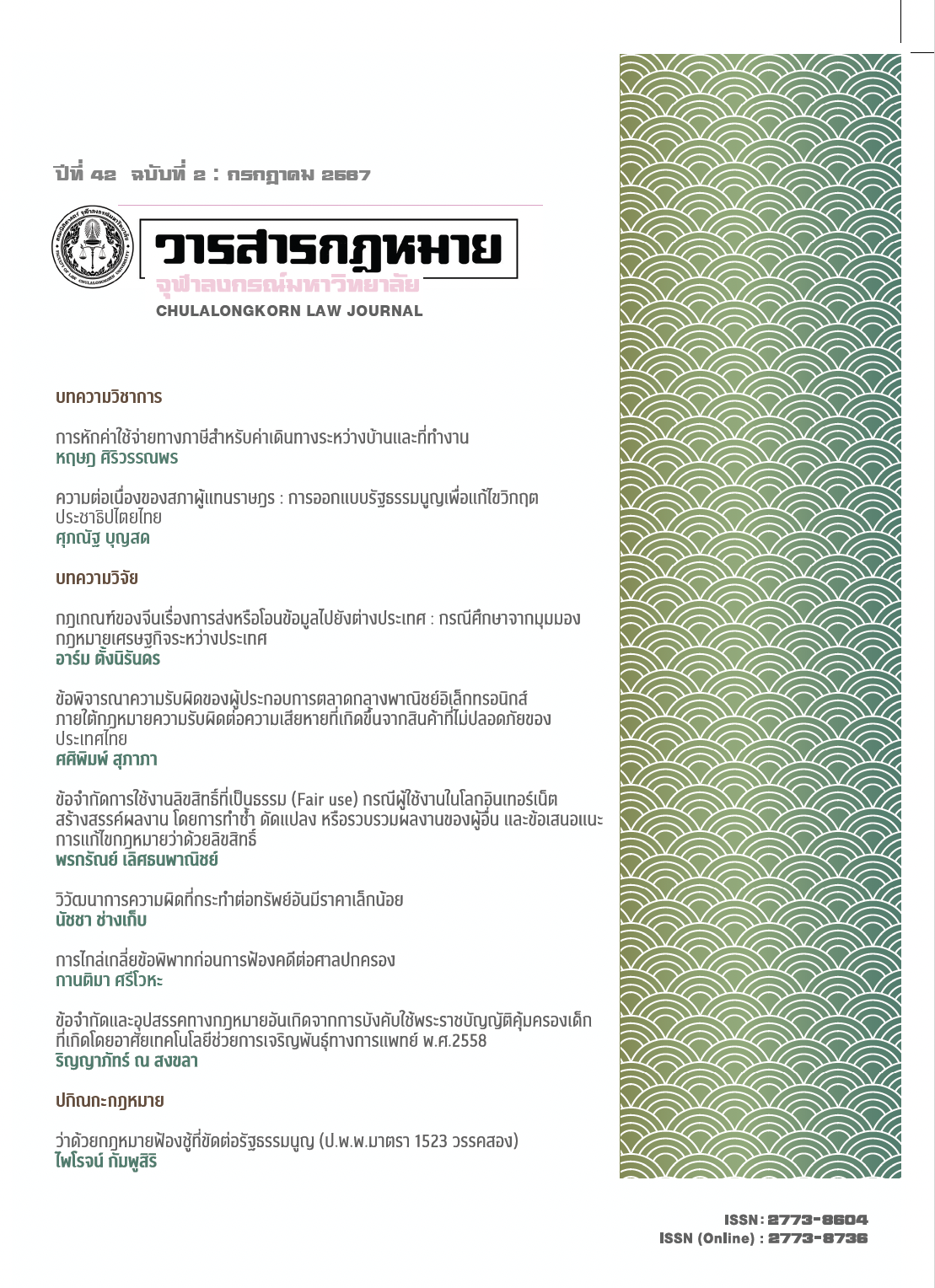กฎเกณฑ์ของจีนเรื่องการส่งหรือโอนข้อมูลไปยังต่างประเทศ : กรณีศึกษาจากมุมมองกฎหมายเศรษฐกิจระหว่างประเทศ
Main Article Content
บทคัดย่อ
ตั้งแต่ปี ค.ศ. 2016 รัฐบาลจีนได้ยกระดับการควบคุมข้อมูลที่ส่งออกจากประเทศจีน โดยใช้กฎเกณฑ์ที่เข้มงวดซึ่งหากเข้าเงื่อนไขที่กำหนด ผู้ส่งออกข้อมูลจำเป็นต้องได้รับการอนุญาตจากสำนักงานบริหารไซเบอร์สเปซแห่งชาติจีนในการส่งข้อมูลออกนอกประเทศจีน จากการศึกษากรอบความตกลงทางเศรษฐกิจระหว่างประเทศที่จีนได้เข้าร่วม ได้แก่ กรอบองค์การการค้าโลก (โดยเฉพาะความตกลงทั่วไปว่าด้วยการค้าบริการ) และกรอบความตกลง RCEP ตลอดจนกรอบความตกลงทางเศรษฐกิจระหว่างประเทศที่จีนได้ยื่นคำขอที่จะเข้าร่วม ได้แก่ ความตกลง CPTPP และความตกลง DEPA พบว่า ความตกลงทางเศรษฐกิจระหว่างประเทศเหล่านี้ยังไม่สามารถกำกับดูแลหรือผลักดันให้จีนปรับเปลี่ยนกฎเกณฑ์ในการส่งหรือโอนข้อมูลไปยังต่างประเทศให้คลายความเข้มงวดลงได้ สะท้อนให้เห็นถึงความแตกต่างอย่างชัดเจนระหว่างแนวทางของจีนซึ่งให้ความสำคัญกับความมั่นคงและอธิปไตยทางไซเบอร์ของชาติกับแนวทางสากลที่นำโดยสหรัฐอเมริกาซึ่งพยายามส่งเสริมให้เกิดการไหลเวียนของข้อมูลข้ามพรมแดนอย่างเสรี
Article Details

อนุญาตภายใต้เงื่อนไข Creative Commons Attribution-NonCommercial-NoDerivatives 4.0 International License.
ลิขสิทธิ์และเนื้อหาในเว็บไซต์ของวารสารกฎหมาย (รวมถึง โดยไม่จำกัดเฉพาะ เนื้อหา รหัสคอมพิวเตอร์ งานศิลป์ ภาพถ่าย รูปภาพ ดนตรีกรรม โสตทัศนวัสดุ) เป็นกรรมสิทธิ์ของวารสารกฎหมาย และผู้ได้รับการโอนสิทธิทุกราย
1. วารสารกฎหมาย ให้อนุญาตให้คุณใช้สิทธิอันไม่เฉพาะเจาะจงที่สามารถถูกถอนเมื่อใดก็ได้ โดยไม่มีค่าใช้จ่าย ในการ
- เยี่ยมชมเว็บไซต์และเอกสารในเว็บไซต์นี้ จากคอมพิวเตอร์หรือเครื่องมือสื่อสารผ่านเว็บบราวเซอร์
- คัดลอกและจัดเก็บเว็บไซต์และเอกสารในเว็บไซต์นี้บนลงคอมพิวเตอร์ของคุณผ่านระบบความจำ cache
- สั่งพิมพ์เอกสารจากเว็บไซต์นี้สำหรับการใช้ส่วนตัวของคุณ
- ผลงานที่ได้รับการตีพิมพ์โดยวารสารกฎหมาย จุฬาลงกรณ์มหาวิทยาลัย ถูกคุ้มครองภายใต้ Creative Commons Attribution 4.0 International License ซึ่งอนุญาตให้ทุกคนสามารถคัดลอก แจกจ่าย ดัดแปลง ส่งต่อ ผลงานได้ ก็ต่อเมื่อผลงานและแหล่งข้อมูลได้รับการอ้างอิงอย่างเหมาะสม
2. วารสารกฎหมาย จุฬาลงกรณ์มหาวิทยาลัย สงวนสิทธิ์ไม่อนุญาตให้คุณใช้สิทธิอื่นใดที่เกี่ยวข้องกับเว็บไซต์และเอกสารบนเว็บไซต์นี้ เช่น การคัดลอก ดัดแปลง เปลี่ยนแปลง ส่งต่อ ตีพิมพ์ แจกจ่าย เผยแพร่ จัดแสดงในที่สาธารณะ ไม่ว่าจะในรูปแบบใดก็ตาม ซึ่งเว็บไซต์หรือเอกสารบนเว็บไซต์ โดยไม่อ้างอิงถึงแหล่งข้อมูลหรือโดยไม่ได้รับอนุญาตเป็นลายลักษณ์อักษรจากวารสารกฎหมาย จุฬาลงกรณ์มหาวิทยาลัย
3. คุณอาจขออนุญาตที่จะใช้เอกสารอันมีลิขสิทธิ์บนเว็บไซต์นี้โดยการเขียนอีเมลล์มายัง journal@law.chula.ac.th
4. วารสารกฎหมาย จุฬาลงกรณ์มหาวิทยาลัย เข้มงวดกับการคุ้มครองลิขสิทธิ์อย่างมาก หากวารสารกฎหมาย จุฬาลงกรณ์มหาวิทยาลัยพบว่าคุณได้ใช้เอกสารอันมีลิขสิทธิ์บนเว็บไซต์นี้โดยไม่ถูกต้องตามการอนุญาตให้ใช้สิทธิ ดังที่กล่าวไปข้างต้น วารสารกฎหมาย จุฬาลงกรณ์มหาวิทยาลัยอาจดำเนินคดีตามกฎหมายต่อคุณได้ เพื่อเรียกร้องค่าเสียหายที่เป็นตัวเงินและคำขอชั่วคราวให้คุณหยุดการใช้เอกสารดังกล่าว ทั้งนี้ คุณอาจถูกสั่งให้ชดใช้ค่าใช้จ่ายใดๆ ที่เกี่ยวข้องกับการดำเนินการตามกฎหมายนี้
หากคุณพบเห็นการใช้เอกสารอันมีลิขสิทธิ์ของวารสารกฎหมาย จุฬาลงกรณ์มหาวิทยาลัย ที่ขัดหรืออาจขัดต่อการอนุญาตให้ใช้สิทธิดังที่ได้กล่าวไปข้างต้น โดยเชื่อว่าได้ละเมิดลิขสิทธิ์ของคุณหรือของผู้อื่น สามารถร้องเรียนมาได้ที่ journal@law.chula.ac.th
เอกสารอ้างอิง
Alex He, “Trade Deals Might Induce Beijing to Bend on Data Restrictions,” [online] Available from : https://www.cigionline.org/articles/trade-deals-might-induce-beijing-to-bend-on-data-restrictions. [12 February 2024]
Andrew D. Mitchell and Neha Mishra, “WTO Law and Cross-Border Data Flows An Unfinished Agenda,” in Big Data and Global Trade Law, ed. M. Burri (Cambridge: Cambridge University Press, 2021)
Annex I of DEPA
Appellate Body Report, United States — Measures Affecting the Cross-Border Supply of Gambling and Betting Services, Para. 307, WTO Doc. WT/DS285/AB/R (7 April 2005).
Article 10 of Security Assessment Measures 《数据出境安全评估办法》
Article 12.15(2) of RCEP
Article 12.15(3) of RCEP
Article 12.15(3)(a) of RCEP
Article 14 of Security Assessment Measures 《数据出境安全评估办法》
Article 14.11(3) of CPTPP
Article 14.11(3)(b) of CPTPP
Article 14A.1 of DEPA
Article 2 of Critical Information Infrastructure Security Protection Regulations 《关键信息基础设施安全保护条例》 (2021)
Article 28 of Personal Information Protection Law of the People’s Republic of China 《中华人民共和国个人信息保护法》 (2021)
Article 31 of Data Security Law of the People’s Republic of China 《中华人民共和国数据安全法》 (2021)
Article 37 of Cybersecurity Law of the People’s Republic of China 《中华人民共和国网络安全法》 (2016)
Article 38 of Personal Information Protection Law 《中华人民共和国个人信息保护法》
Article 4 of Personal Information Protection Law 《中华人民共和国个人信息保护法》 (2021)
Article 4(2) of Security Assessment Measures 《数据出境安全评估办法》
Article 4(3) of Security Assessment Measures 《数据出境安全评估办法》
Article 4.3(3) of DEPA
Article 6 of Security Assessment Measures 《数据出境安全评估办法》
Article 7 of Security Assessment Measures 《数据出境安全评估办法》
Article 8 of Cybersecurity Law 《中华人民共和国网络安全法》 (2016)
Article 9 of Critical Information Infrastructure Security Protection Regulations 《关键信息基础设施安全保护条例》 (2021)
Article VI:1 of GATS
Article XIV of GATS
Article XVI of GATS
Article XVII of GATS
British Chamber of Commerce in China, “The Cross-Border Data and Innovation Report 2021,” [online] Available from : https://www.britishchamber.cn/wp-content/uploads/2021/11/BritCham-China-Cross-Border-Data-and-Innovation-Report.pdf. [12 February 2024]
Cybersecurity Law 《中华人民共和国网络安全法》 (2016) and Article 38 and 40 of Personal Information Protection Law 《中华人民共和国个人信息保护法》
David Cyranoski, “China’s Crackdown on Genetics Breaches Could Deter Data Sharing,” [online] Available from : https://www.nature.com/articles/d41586-018-07222-2. [12 February 2024]
Fengan Jiang, “China’s Legal Efforts to Facilitate Cross-border Data Transfers: A Comprehensive Reality Check”, in Asia Pacific Law Review, 32, 1 (2024): 81-101, 87.
Henry S. Gao, “Data Regulation with Chinese Characteristics,” in Big Data and Global Trade Law, ed. M. Burri (Cambridge: Cambridge University Press, 2021)
Joshua P. Meltzer, “China’s Digital Services Trade and Data Governance: How Should the United States Respond?,” [online] Available from : https://www.brookings.edu/articles/chinas-digital-services-trade-and-data-governance-how-should-the-united-states-respond. [12 February 2024]
Leika Kihara, “DAVOS – Nearly Half WTO Members Agree to Talks on New E-Commerce Rules,” [online] Available from : https://www.reuters.com/article/davos-meeting-ecommerce-idUSL3N1ZP329. [12 February 2024]
Linxin Dai, “A Survey of Cross-Border Data Transfer Regulations Through the Lens of the International Trade Law Regime”, in New York University Journal of International Law and Politics, 52 (2019): 955-966.
Maria A. Carrai, “Can China Succeed in Joining the CPTPP?,” [online] Available from : https://www.hinrichfoundation.com/research/wp/ftas/china-cptpp-comprehensive-and-progressive-trans-pacific-partnership. [12 February 2024]
Measures on Standard Contracts for the Export of Personal Information 《个人信息出境标准合同办法》 (2022)
Ministry of Commerce, People’s Republic of China, “China Has Submitted an Official Application to Join the Digital Economy Partnership Agreement (DEPA),” [online] Available from : http://english.mofcom.gov.cn/article/newsrelease/significantnews/202111/20211103214781.shtml. [12 February 2024]
Mira Burri, “Data Flows and Global Trade Law,” in Big Data and Global Trade Law, ed. Mira Burri (Cambridge University Press, 2021)
Mira Burri, “The Regulation of Data Flows Through Trade Agreements”, in Georgetown Journal of International Law, 48, 1 (2017): 413-414.
OECD, “Mapping Approaches to Data and Data Flows: Report for the G20 Digital Economy Task Force, Saudi Arabia (2020),” [online] Available from : https://www.oecd.org/sti/mapping-approaches-to-data-and-data-flows.pdf. [12 February 2024]
OECD, WTO and IMF, “Handbook on Measuring Digital Trade (2020),” [online] Available from : https://www.oecd-ilibrary.org/trade/handbook-on-measuring-digital-trade-second-edition_ac99e6d3-en. [12 February 2024]
Para 2.2 of A Guide to Cybersecurity Standard Practices – Guidelines for Classification and Grading of Network Data 《网络安全标准 实践指南—网络数据分类分级指引》 (2022)
Practice Guidelines for Cyber Security Standards – Security Certification Specifications for Cross-Border Processing of Personal Information V2.0 《网络安全标准实践指南—个人信息跨境处理活动安全认证规范V2.0》(2022)
Security Assessment Measures and Guidelines for the Application for Security Assessment for Outbound Data Transfer (First Edition) 《数据出境安全评估申报指南(第一版)》 (2022)
Shin-yi Peng and Han-wei Liu, “The Legality of Data Residency Requirements: How Can the Trans-Pacific Partnership Help”, in Journal of World Trade, 51, 2 (2017): 195-197.
Susannah Hodson, “Applying WTO and FTA Discipline to Data Localization Measures”, in World Trade Review, 18, 4 (2019): 579-607.
Timothy Wu, “The World Trade Law of Censorship and Internet Filtering”, in Chicago Journal of International Law, 7 (2006): 263-287, 264.
Work Programme on Electronic Commerce, Non-Paper from the United States, JOB/GC/94 (2016)
WTO, Joint Statement on Electronic Commerce, Communication from China, 24 April 2019, INF/ECOM/19.
WTO, Joint Statement on Electronic Commerce, Ministerial Conference, 11th Session, Buenos Aires, 10–13 December 2017, WT/MIN(17)/ST/60 (2017).
Xinhua, “Commerce Ministry: China Advancing Negotiations on Joining DEPA,” [online] Available from : https://english.www.gov.cn/statecouncil/ministries/202208/23/content_WS6304085dc6d02e533532f955.html. [12 February 2024]
Yik-Chan Chin and Jingwu Zhao, “Governing Cross-Border Data Flows: International Trade Agreements and Their Limits”, in Laws, 11(4), 63 (2022): 1-22.


